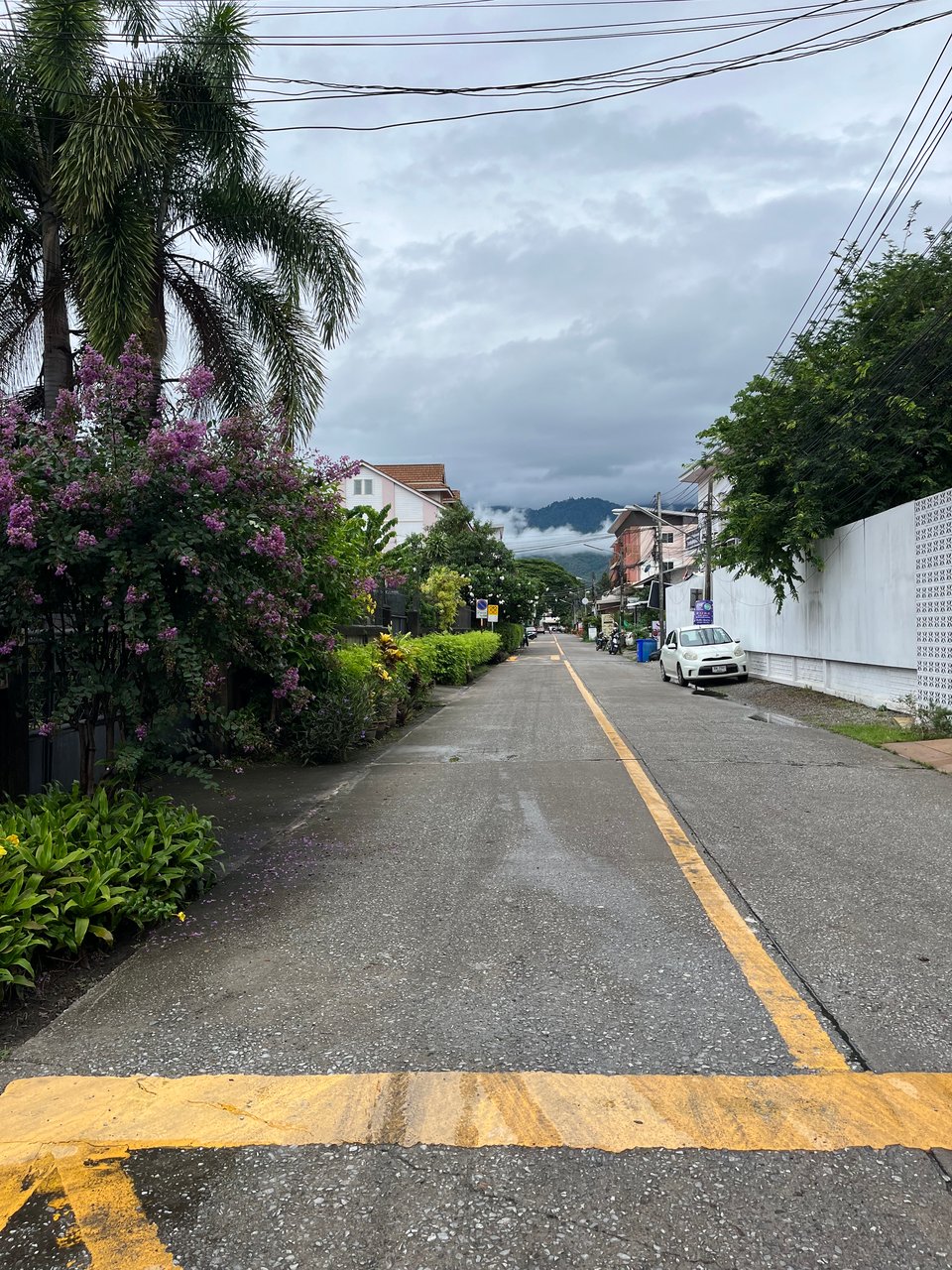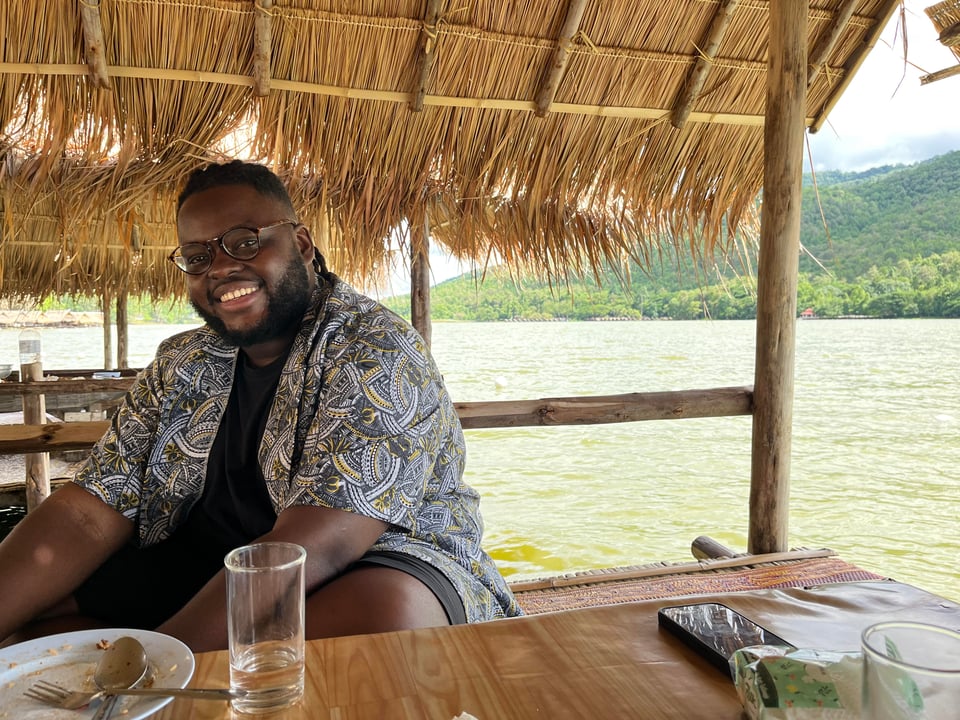#1: rules for short-term intimacy
a subject matter expert speaks
We barely know each other but Kevin is dishing. We’re barefoot, our legs folded under us in a bamboo hut on the water. Our spot for the afternoon. We’ve just finished lunch and I’m asking him what it’s like to date in a place with so many tourists.
After three years of living in Chiang Mai, Kevin says he’s developed a rule: No getting involved with people in town for less than a week.
“On Tinder here, it’s basically, ‘I’m here for three days, I’m here for four days.’ It gets tiring very, very quickly,” he says, his accent just barely perceptible. Ivorian, maybe a touch Quebecois, too.
His one-week rule sounds a little arbitrary. I tell him that many people would also be wary of entering into a, say, two-week relationship because of the potential to get hurt. “I’m curious about the pain,” I tell him.
accept loneliness
I met Kevin at a bar on my third night in Chiang Mai, a northern Thai city nestled in the mountains. It was rainy season, a respite from Manila’s unrelenting summer and my first solo trip abroad in a decade. I had already gotten drenched twice. Dark-skinned and with a heft to him, Kevin was hanging out on the covered back patio, talking to a bartender I had met the night before (my preferred travel style, I’ve realized, is to haunt). My quick take on him: warm, open, and importantly, not creepy. And so I asked if I could sit on the couch, next to him. For sure, he said, like we were already friends.
I wanted to meet people on my weeklong stay in Chiang Mai. I was coming off many months of what I described as a monastic lifestyle in Manila: no socializing, no late nights, no excess. Which is not to say no pleasure. But now I felt ready to let people in—something I knew was particularly accessible to someone traveling alone.
What I was looking for was not necessarily sexual. I missed the thrill of creating something with a stranger, the crackle of discovering what was alive between us. With sex, there was a script. Outside of it, I often felt, laid more possibility.

It was Kevin who brought up short-term intimacy the night we met, as the rain battered the roof and we traded stories about moving abroad in our thirties. He was raving about his new life, and so I asked, OK but, is there anything hard about it? It can be lonely, he said, adding that living in a place with so many tourists had taught him about brief relationships.
It wasn't a come-on. The vibe was earnest and platonic, which I clocked as a good sign, wary of the kind of guy who only shares something of himself if he thinks fucking is on the table.
In the following days, we made plans to hang out again: He would take me on his motorbike—the standard mode of transportation here—to a quiet lake where you could eat papaya salad and pad krapow in huts on the banks. And I decided, on my best friend’s prompting, to see if he’d let me interview him for my newsletter about this specific kind of intimacy he had grown to know so well.
chill on the escalator
In our hut on the water, Kevin tells me that in his twenties in Montreal, he kept pushing casual relationships into more serious territory without considering if he really wanted to. He moves his hand skyward, emulating a staircase. When the relationships ended, he’d think: Why did I do that? “I felt like I had to,” he says, “or it wouldn’t have been valid.”
He knew what it sounded like when a guy said he only wanted a “short-term” thing: “Boom, directly, fuckboy!” Which makes me laugh because absolutely, and also because Kevin is not giving fboy, more like sensitive softboy.
“Sometimes, you tend to push things, like, ‘Oh, they’re only here a month, we need to do as much as we can.’ That can become too intense for no reason.”
In his late twenties, Kevin started hooking up with a friend. “I was the one who was like, I need to escalate it, like, I wanna see you more, I wanna be with you,” he tells me. But she said she just wanted to be friends.
At first, it felt like a rejection. “Like, oh, she doesn’t want me.” But ultimately, she shifted his thinking about the validity of different kinds of relationships. Not every relationship is meant to be escalated.
It helped that she meant what she said about being friends. She still cared about him—that was clear through her actions. Just because someone doesn’t wanna be your partner doesn’t mean they’re rejecting you as a person, he said he realized.
don’t chase intensity
“If you meet someone and they’re only gonna be here for a month, do you find yourself having some kind of boundary up?” I ask.
I’m bringing it back to pain, to self-protection. The juicy stuff.
He says he watches for a sense of urgency. “Sometimes, you tend to push things, like, ‘Oh, they’re only here a month, we need to do as much as we can.’ That can become too intense for no reason.”
Wait, what? I think to myself. You don’t like to make your brief romances as intense as possible and watch everything explode in pain when it’s over? I feel a little attacked.

He also says that after someone leaves, he’s learned not to do things like texting morning and night because that’d be disingenuous. He’s not trying to get into a long-distance relationship. Ah, yes. My friend and I call this “penpalling,” a cousin of lovebombing, and I have been both recipient and participant myself.
My reaction to his approach—so grounded and tempered—makes me realize I’ve long associated intensity (read: messiness, pain) with “real feeling.” That chasing the intensity of a short-term thing is what makes it feel meaningful and valid, especially when these kinds of relationships aren’t respected in that way.
catch feelings
“When someone leaves, does it fuck you up?” I ask. We’re almost done but I’m still asking about pain.
I do get sad, he says, but it’s not like…he contorts his body into what I can only guess is an approximation of a pitifully sad creature, and I laugh. “As long as I know it’s gonna end, I accept it.” It’s so mature that it’s almost obnoxious. So mature that I wonder if it’s true, or if I’ve just reached the boundary of what I can expect to learn in two hangouts.
Like Kevin, my twenties were full of trying to convert hookups into something longer-term, even if I could tell we weren’t a good fit. Talking to him helps me see that I wanted to find a way to prove that the relationships had meant something. That I had meant something to these people. (God forbid I didn’t!) And if the relationship didn’t last, I wanted at least to know that my exes had felt like shit after. Pain, I thought, was a way of gauging real feeling.
I finally ask this one directly, even though I feel like I already know the answer.
“Do you feel like you develop real feelings for the women you briefly date?”
He answers with ease, in the affirmative. For him, “catching feelings” is not something he’s trying to avoid. “Sex is the most intimate thing you can do with someone,” he says, “of course you’re going to catch feelings.”
Only later do I realize it’s a question I wish I could ask all my own short-term lovers. But Kevin is not my lover. He’s someone who’s willing to answer all my suddenly very personal questions. Someone who witnesses me remembering what it’s like to interview someone, how I return to myself. Someone who delivers me home. On his motorbike, no threat of rain. I feel the heat from his back, a little bit of danger.
thank you to bea troxel, kayla min andrews, and yowei shaw for reading and shaping drafts, and of course, to kevin togba, for being down.
Add a comment: